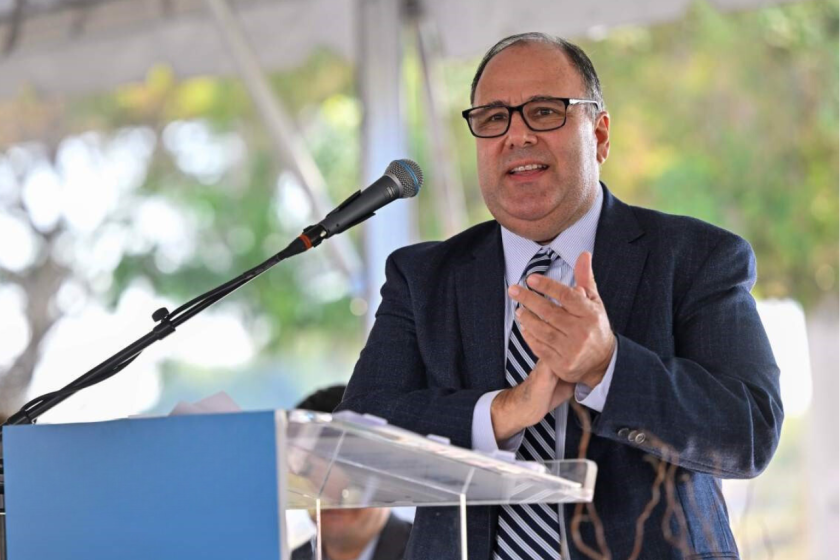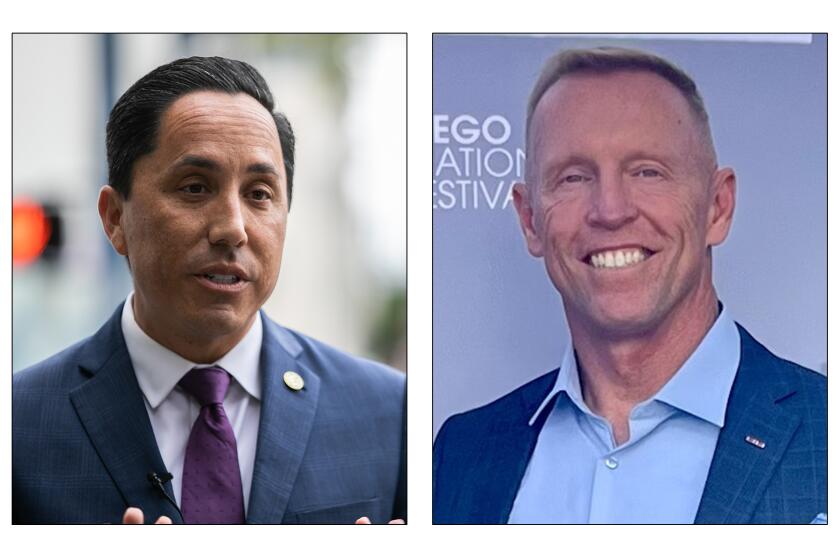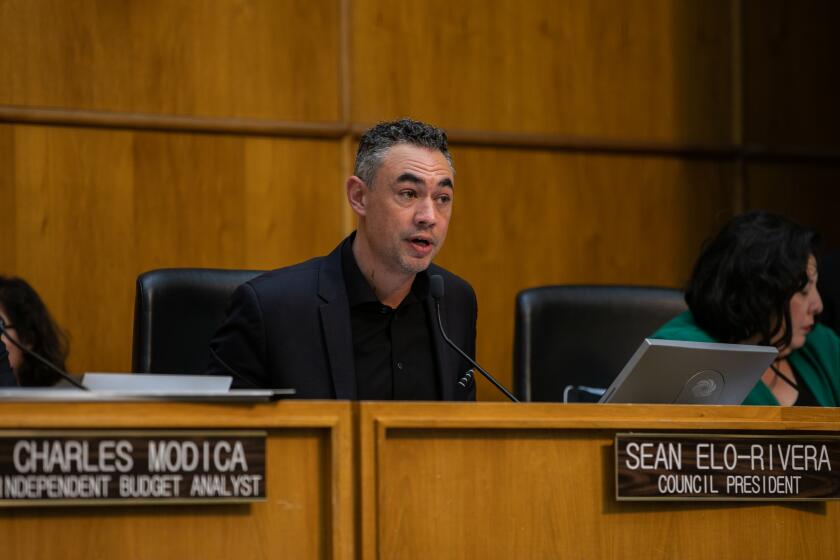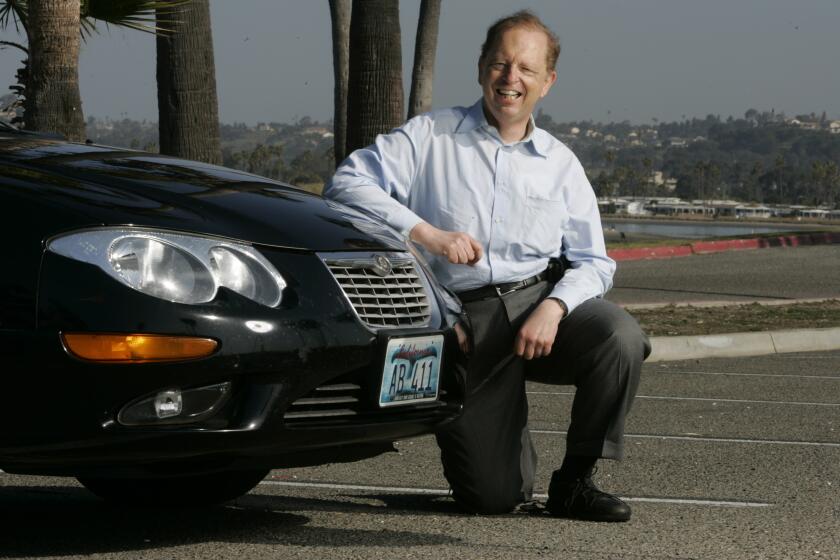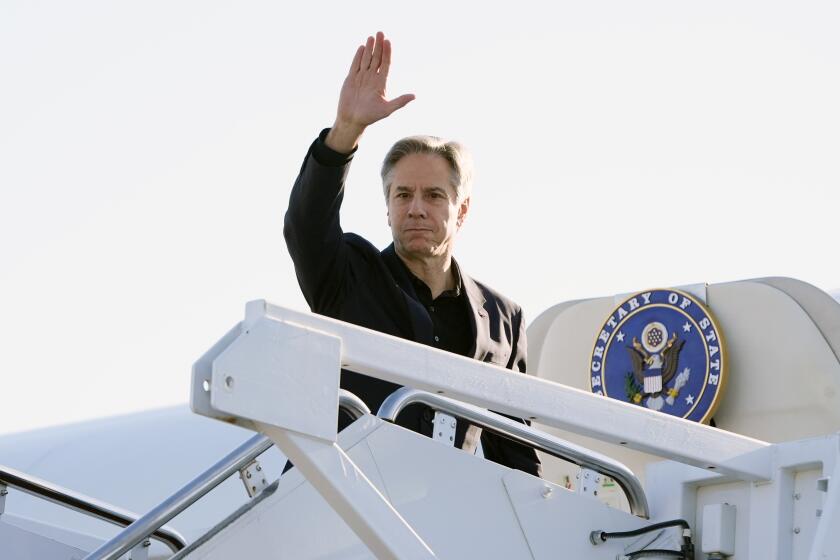Proposal would ease removal of wayward officials
Nearly three years after San Diego struggled to remove embattled Mayor Bob Filner from office, city officials say they’re ready to put greatly expanded opportunities to oust wayward officials on the November ballot.
Some of the new removal methods are more aggressive than what other cities allow, such as suspending officials when they’ve been criminally charged but not convicted, and letting the City Council put a removal vote on the ballot by unanimously declaring “no confidence” in the mayor or city attorney.
Many others are more common, such as allowing removal for being convicted or pleading guilty to a felony, being convicted or pleading guilty to a misdemeanor involving moral turpitude, or being found civilly liable for misconduct related to an official’s job.
The list, which the council is scheduled to debate July 11 and place on the November ballot a few weeks later, also includes removal for dereliction of duty, unlawful non-criminal conduct like racial discrimination, or being declared mentally or physically incompetent by a judge.
The list would dramatically expand the opportunities for removing elected officials now included in San Diego’s City Charter, which is unusually limited compared to other cities.
Death, resignation or a recall election have been the main options San Diegans have had. The charter lists six types of misconduct that could lead to removal, but they are narrowly focused situations related to city contracts and fraud in making payments.
City Attorney Jan Goldsmith has called the new list, which the city’s Charter Review and Rules committees began debating this spring, a much-needed set of safety valves that could help if there’s ever a situation similar to the 2013 Filner sexual harassment scandal.
Because the charter provides so few options, Goldsmith had to employ unusual tactics like threats and bluffs in his efforts to get the former mayor to resign. And the deal Goldsmith finally forged included the city agreeing to cover Filner’s legal defense against multiple harassment lawsuits.
To reduce the chances that political divisiveness will play a role, the more aggressive new methods of removal would require either a three-fourths council vote or a unanimous council vote to put the question of removal on a ballot. Once on the ballot, the question of removal would need support from a simple majority of city voters to be approved.
All of the new removal methods would apply to all elected officials except the “no confidence” vote, which would apply only to the mayor and city attorney.
The proposed changes would include a new charter section called “Removal for Cause,” which would allow the council, with a three-fourths vote, to place a removal vote on the ballot for a variety of misdemeanor transgressions described as crimes of moral turpitude. They include such things as embezzlement, child abuse, arson and possession of heroin for sale.
The council has nine members, so a three-fourths vote would require support from seven of them.
This new section is similar to removal procedures in many other cities, but the charter update proposal would go significantly further by allowing the council to put a removal vote on the ballot without a specified reason if the council unanimously declares “no confidence” in the mayor or city attorney.
Goldsmith concedes this is a legally untested approach that no other cities in California use. Supporters, however, contend that a unanimous vote would be highly unlikely unless the mayor or city attorney has done something significantly troublesome.
Another unusual element of the proposed changes is allowing the council, with a three-fourths vote, to suspend an elected official who has been criminally charged — but not convicted —with a misdemeanor crime of moral turpitude or any felony. The council would also be given the latitude to appoint a temporary replacement while the official is removed from his or her duties by the suspension.
The goal would be preventing a wayward official from remaining in office during the course of a lengthy trial.
But this week Councilwoman Marti Emerald said that goal must be weighed against concerns about due process.
“It’s easy to make allegations against a person in the public eye, but it’s another thing to actually see that person convicted by a jury of their peers,” Emerald said.
Council President Sherri Lightner stressed that a suspension would require the filing of criminal charges for a significant crime, and a subsequent three-fourths vote by the council.
Emerald, however, said during a June 20 Rules Committee meeting that council members could feel political pressure not to stand up for the due process rights of an accused politician.
“Those votes are often taken politically, not necessarily based on the legal theory that a person is innocent until proven guilty,” she said. “People go along to get along.”
Emerald suggested that the need to carefully vet the language of the proposed changes, primarily to avoid unintended consequences, means the city should consider delaying this set of charter changes to a future election beyond this November.
Lightner, who has spearheaded a two-year effort to clean up the outdated charter, disagreed and vowed that the council would vote to place the new removal options on the November ballot before an Aug. 2 deadline to do so.
Get Essential San Diego, weekday mornings
Get top headlines from the Union-Tribune in your inbox weekday mornings, including top news, local, sports, business, entertainment and opinion.
You may occasionally receive promotional content from the San Diego Union-Tribune.

